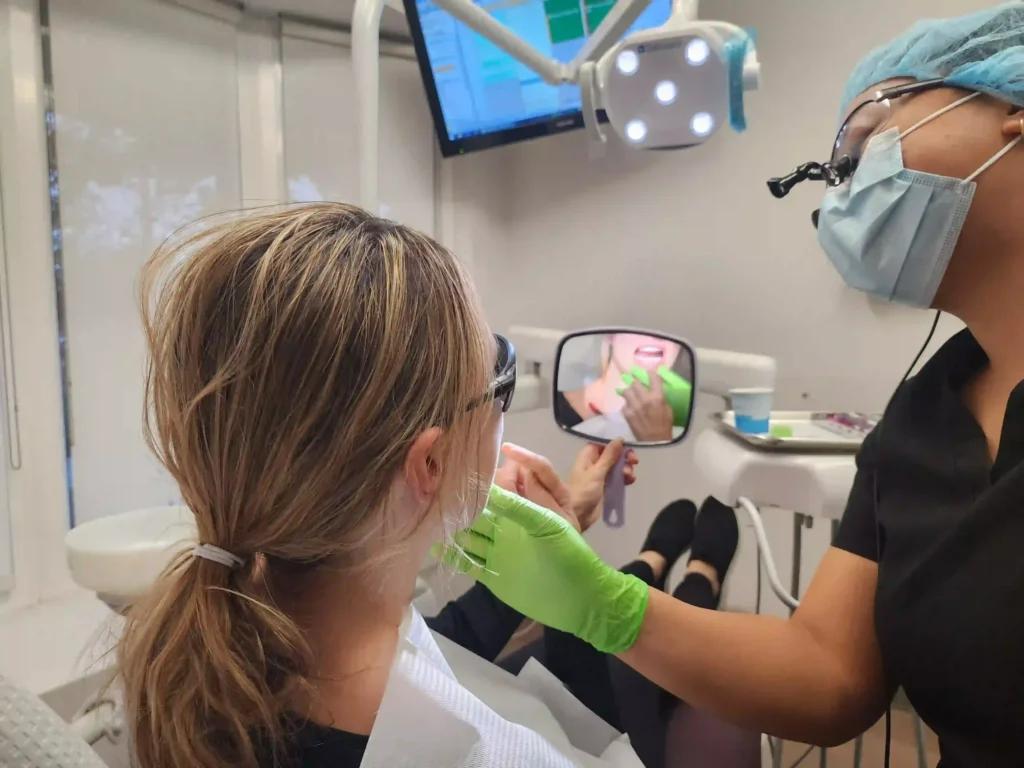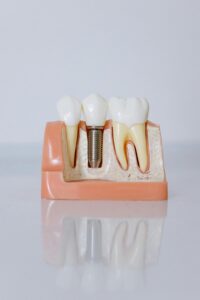As a parent, there’s nothing quite as concerning as finding out your child has a cavity. Cavities, also known as tooth decay, are one of the most common health problems affecting children today. In fact, the Centers for Disease Control and Prevention (CDC) reports that nearly 1 in 5 children aged 5 to 11 years have at least one untreated decayed tooth.
While discovering a cavity in your child’s mouth can be stressful, it’s important to remember that cavities are very treatable, especially when caught early. By taking the right steps, you can help your child get their oral health back on track and prevent further decay.
In this blog post, we’ll cover everything you need to know about what to do when your child has a cavity, from understanding the causes to navigating the treatment process. With the right knowledge and approach, you can help your child overcome this common dental issue and develop healthy oral habits that will last a lifetime.
Understanding Cavities in Children
Before we dive into the steps to address a cavity, it’s helpful to first understand what causes them and how they develop in children.
Cavities are essentially areas of permanent damage to the hard surface of a tooth. They are caused by a combination of factors, including:
- Bacteria: Our mouths naturally contain many types of bacteria, some of which produce acids that can erode tooth enamel and lead to cavities if not properly managed.
- Frequent Snacking: Frequent snacking, especially on sugary or starchy foods, provides a consistent food source for cavity-causing bacteria. This allows them to produce acids that attack the teeth.
- Inadequate Brushing: If teeth are not thoroughly brushed and flossed on a regular basis, food particles and plaque can build up, leading to decay.
- Dry Mouth: Saliva helps wash away food and neutralize acid, so children with a chronically dry mouth are more susceptible to cavities.
- Fluoride Deficiency: Fluoride is a mineral that strengthens tooth enamel and prevents cavities. Children who don’t get enough fluoride from sources like toothpaste, water, or supplements are at higher risk.
Cavities typically start small, appearing as tiny holes or spots on the tooth surface. If left untreated, they can grow larger and deeper, eventually reaching the inner layers of the tooth and causing pain, infection, and other serious problems.
The good news is that cavities are highly preventable with proper oral hygiene and regular dental care. However, if a cavity does develop, it’s important to address it promptly to stop the decay from progressing.
Steps to Take When Your Child Has a Cavity
- Schedule a Dental Appointment: The first step is to make an appointment with your child’s dentist as soon as possible. Catching and treating cavities early is crucial, as small cavities are much easier and less expensive to fix than large, deep ones.
Your dentist will thoroughly examine your child’s teeth and determine the best course of treatment based on the size and location of the cavity. They may also take X-rays to get a better look at the extent of the decay. - Discuss Treatment Options: Once the dentist has assessed the cavity, they will explain the available treatment options. The most common approach for children is a dental filling, where the decayed portion of the tooth is removed and replaced with a tooth-colored material.
In some cases, if the cavity is very deep or the tooth is severely damaged, the dentist may recommend a root canal or even tooth extraction. While these procedures may sound daunting, they are often necessary to prevent the spread of infection and further damage.
Be sure to ask the dentist any questions you or your child may have about the treatment process, including what to expect during the procedure, how long it will take, and any potential discomfort or side effects. - Prepare Your Child: Helping your child feel calm and prepared for their dental appointment can go a long way in making the experience less stressful. Here are some tips:
- Explain the process in a simple, age-appropriate way, emphasizing that the dentist is there to help and that it won’t hurt.
- Role-play the appointment at home, using a toothbrush or other toy as a “dental tool.”
- Bring a favorite toy, book, or comfort item to the appointment to help your child feel secure.
- Praise and reward your child for their bravery and cooperation throughout the process.
- Follow Aftercare Instructions: After the cavity is treated, be sure to follow any aftercare instructions provided by the dentist. This may include:
- Avoiding certain foods or drinks for a period of time
- Gently brushing and flossing the affected area
- Using a special toothpaste or mouthwash
- Scheduling a follow-up appointment to monitor the progress
- Adhering to these instructions is crucial for ensuring the filling or other treatment is successful and preventing further decay or complications.
- Establish Healthy Oral Habits: Once the immediate cavity issue has been addressed, it’s important to focus on preventing future cavities. This involves:
- Encouraging your child to brush their teeth twice a day for two minutes each time, using a soft-bristled toothbrush and fluoride toothpaste.
- Helping your child floss once a day, or using floss picks or other interdental cleaners.
- Limiting sugary and starchy snacks, and providing healthier options like fresh fruits and vegetables.
- Ensuring your child is getting enough fluoride, either through fluoridated water, supplements, or professional fluoride treatments.
- Scheduling regular dental checkups and cleanings every six months.
By consistently practicing good oral hygiene and making dental care a priority, you can help your child avoid future cavities and maintain a healthy, beautiful smile.
Coping with Dental Anxiety
For many children (and adults!), the prospect of going to the dentist can be a source of significant anxiety and fear. This is a completely normal reaction, and it’s important to validate your child’s feelings and work with them to overcome their dental anxiety.
Here are some strategies that can help:
- Communicate Openly: Encourage your child to express their concerns and fears about the dental visit. Listen without judgment and assure them that it’s okay to feel nervous.
- Provide Distractions: Bring along a favorite toy, book, or electronic device to help keep your child occupied and distracted during the appointment.
- Use Positive Reinforcement: Praise and reward your child for their bravery and cooperation throughout the process. This can help build their confidence and associate dental visits with something positive.
- Consider Sedation Options: In some cases, the dentist may recommend a mild sedative or numbing medication to help your child feel more relaxed and comfortable during the procedure.
- Seek Out Child-Friendly Dentists: Look for a pediatric dentist or one who specializes in treating children. They often have specialized techniques and a gentle, patient-centered approach that can make the experience much more enjoyable for kids.
By addressing your child’s dental anxiety head-on and providing the necessary support, you can help them overcome their fears and develop a positive relationship with dental care.
Preventing Future Cavities
Once your child’s cavity has been treated, the focus should shift to preventing future dental issues. Here are some key strategies to keep in mind:
- Establish a Consistent Oral Hygiene Routine: Ensure your child brushes their teeth twice a day for two minutes each time, and floss once a day. Make this a consistent habit and, if needed, use a reward system to encourage compliance.
- Limit Sugary and Acidic Foods/Drinks: Reduce your child’s intake of sugary snacks, candies, and sweetened beverages, as these can contribute to tooth decay. Opt for healthier alternatives like fresh fruits, vegetables, and water.
- Encourage Fluoride Exposure: Fluoride is a mineral that strengthens tooth enamel and prevents cavities. Make sure your child is getting enough fluoride, either through fluoridated water, toothpaste, or professional fluoride treatments.
- Schedule Regular Dental Checkups: Regular dental visits every six months are crucial for catching any problems early and maintaining good oral health. These visits allow the dentist to clean your child’s teeth, apply sealants if needed, and monitor for any signs of decay or other issues.
- Teach Good Habits: Model and reinforce proper brushing and flossing techniques, and emphasize the importance of a healthy diet and regular dental care. Involving your child in their oral hygiene routine can help them take ownership of their dental health.
By implementing these preventive measures, you can help your child avoid future cavities and set them up for a lifetime of healthy, beautiful smiles.
Conclusion
Discovering that your child has a cavity can be concerning, but it’s important to remember that it’s a common and treatable issue. By taking the right steps, you can help your child get their oral health back on track and prevent further decay.
Remember to schedule a prompt dental appointment, work closely with your child’s dentist to determine the best course of treatment, and establish a solid oral hygiene routine at home. With patience, persistence, and a positive attitude, you can help your child overcome this challenge and develop the healthy habits they need for a lifetime of strong, cavity-free teeth.
If you have any other questions or concerns about your child’s dental health, don’t hesitate to reach out to your pediatric dentist. They are there to support you and your family every step of the way.







